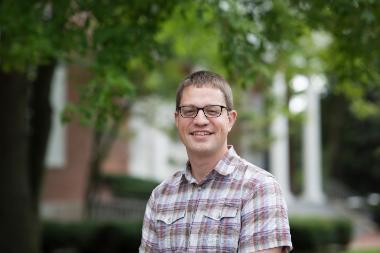April 24, 2019
Dr. Andrew Luhmann, assistant professor of geology at Wheaton College, was awarded funding from the National Science Foundation and the Department of Energy for two research projects.
 Wheaton College Assistant Professor of Geology Dr. Andrew Luhmann takes multi-tasking to a whole new level. With funding from the National Science Foundation and the Department of Energy, Luhmann is managing research projects in Florida, New Mexico and Texas while also teaching in Illinois.
Wheaton College Assistant Professor of Geology Dr. Andrew Luhmann takes multi-tasking to a whole new level. With funding from the National Science Foundation and the Department of Energy, Luhmann is managing research projects in Florida, New Mexico and Texas while also teaching in Illinois.
The Florida Karst Project, funded by the National Science Foundation, is a multi-year project centered in O’Leno State Park in North Central Florida, which he manages in collaboration with colleagues and students at the New Mexico Institute of Mining and Technology and the University of Florida. The project uses seismometers and tiltmeters to detect the displacement of the land surface over different timescales as water levels rise and fall in the aquifer in the park’s karst landscape, which Luhmann explains is a landscape often characterized by sinkholes and caves. They will be using the displacement data to identify flow paths in the aquifer.
“There’s a whole host of reasons as to why this research is important, from a water quality perspective to whether or not you potentially have a hazard for a sinkhole,” Luhmann said. “It’s important to have some idea where caves are located because then you know potential contaminant pathways in the aquifer and can identify locations susceptible to sinkhole collapse in the future.”
This semester, undergraduate students in Luhmann’s hydrogeology class have started working with the data that’s been collected from the sites.
In addition to this project, Luhmann is also working on one related to geologic carbon sequestration, the process of storing carbon dioxide below ground, with funding from the Department of Energy. Along with a team of others, Luhmann is looking at the implications of injecting CO2 into the Farnsworth Oil Field in Ochiltree County, Texas—with the goal of extracting even more oil from the area and securely storing CO2 in the subsurface.
“We are running experiments on rock cores from the Morrow B Sandstone, and what we’re trying to do is identify the changes to the physical and mechanical properties of subsurface reservoirs as we inject CO2 into the subsurface,” he said.
Although Luhmann will be busy in the lab and in the field, writing up findings and managing students, he finds the work rewarding: “As a scientist, we study natural processes, which are only possible because God continually sustains his creation in repetitive ways,” he said. “As we figure some of these things out, it helps us to understand the sustaining work of God in this world. It’s also a pretty humbling experience to see how much time we spend studying and how little of the natural world we actually understand.”--Emily Bratcher